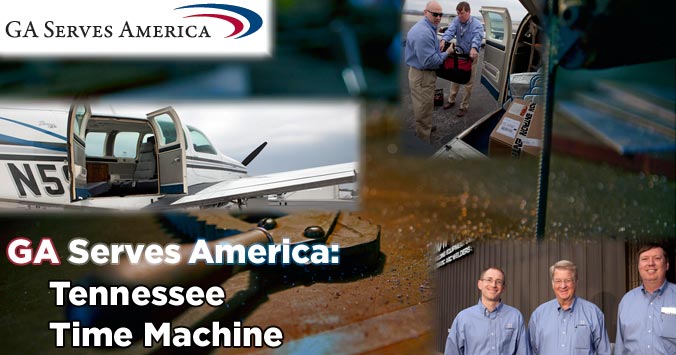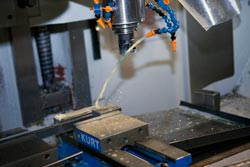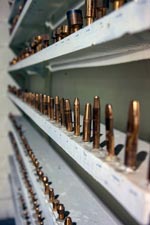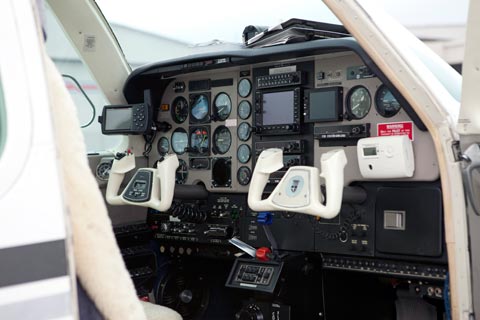GA Serves America: Tennessee time machine
Taking care of business, one flight at a time

James Dillard takes the call from a factory manager in rural Mississippi. The manager, who oversees production of parts used in household furniture, tells Dillard, “I have an entire third shift who doesn’t know if they’re working tonight. We have 300 people waiting on you.” The plant’s computerized welder has stopped working, and the manager needs a new circuit board to continue production. Dillard, vice president of manufacturing and engineering for the T.J. Snow Company in Chattanooga, Tennessee, offers to deliver the needed part in the company’s Beechcraft Bonanza.
When he lands at the small public airport several hours later, just a few miles from the plant, Dillard sees a plume of dust pushing a pickup truck in the distance. Minutes later the plant manager stops the truck on the ramp and says, “You flew here in that? I didn’t even know this airport was here...and I live here!”
Saving the day
“You get to be a hero,” Dillard says. “Our airplane allows us to save the day for a lot of people, and that’s a great feeling.”
The T.J. Snow Company Inc. is a 68-employee welding supply and
service company with a big reputation. Of all the tools the company uses to sell and repair industrial resistance
welders, its airplane is the most prized. The workhorse is a 1987 Bonanza A36, which Snow owns and operates for service calls, preengineering meetings, and on-location training.
When the Mississippi plant manager called T.J. Snow to ask if the company had a certain circuit board in stock, Dillard confirmed it did and offered to ship the part overnight. That wasn’t going to work; the manager needed that circuit board immediately. Flying the Bonanza to hand-deliver the board gave Dillard—and the T.J. Snow Company—a chance to create a new loyal customer.
Started April 1, 1963, by Jim Snow, the firm specializes in designing and building custom resistance welders used by companies that produce parts for a variety of industries. For example, a company may be contracted to build exhaust pieces to certain specifications for an automobile manufacturer. The company will hire T.J. Snow to engineer and build a welder that will weld those exhaust parts. In fact, the automotive industry accounts for 60 percent of T.J. Snow’s business.
Aviation buffs
Jim Snow always loved aviation. At a young age he accumulated enough flight time to solo a Piper J–3 Cub, but he never could hope to complete his training because of an eye injury he suffered as a boy. However, he passed that love of flying along to his son, Tom, the company’s current CEO.
Tom remembers his father taking the family to the airport on Sunday afternoons to watch the airplanes. The younger Snow attributes his own passion for aviation to those afternoons. Tom received his private pilot certificate in 1981 and proudly notes that one of his favorite instructors was Peggy Chabrian, the founder and president of Women in Aviation International.

In 1984, Tom approached his father about purchasing an airplane for company use. Despite his passion for aviation, Jim was determined to keep his company financially sound and didn’t believe an airplane fit that plan. But he gave his son a chance to prove that an airplane had a place in the company, and that year they purchased a Cessna Cardinal. The Cardinal proved so successful it began a series of 13 airplanes owned and operated by the company over the next 26 years. Snow has owned Mooneys, a Piper Twin Comanche, a Cessna Skylane, a Beech Baron, a Piper Seneca, and several others.
David Hetzler, president and chief operating officer of T.J. Snow Co., also needed a little convincing. “Never in my life did I ever expect to say to anyone that an airplane for a business like ours was a good idea. Well, they proved it was,” said Hetzler.
“The use of the airplane has enhanced our status with our customers,” says Dillard. He primarily flies the Bonanza, N59PJ, to customers’ facilities to meet with them for preengineering discussions. “Meeting with them in person gives them a real boost in confidence that we are able to meet their needs,” he says. “It brings us closer to our customers.”
Traveling man
 But Randy Darby sees more flying action than any other T.J. Snow employee. As the lead service technician, Darby logs nearly 20 hours a month traveling to production plants to repair welding equipment.
But Randy Darby sees more flying action than any other T.J. Snow employee. As the lead service technician, Darby logs nearly 20 hours a month traveling to production plants to repair welding equipment.
Darby joined T.J. Snow Co. as a service technician in 1996 repairing circuit boards, a skill he learned as an avionics technician working on Harrier jets in the U.S. Marine Corps. During his first year at T.J. Snow, he spent long, grueling hours in his car driving to client locations to repair welders. He had always wanted to fly, but the goal was financially out of reach until T.J. Snow offered to lend him the funds needed to acquire his private pilot certificate. He quickly moved on to complete his instrument rating, a privilege he uses on every flight.
Darby now wears many hats for the company: service technician, pilot, seminar host, trainer, and educator for client expectations. He will first attempt to troubleshoot and walk a client through a repair over the phone. If a service call is needed, he offers to fly to their location for the job. But at times he is met with “a knee-jerk reaction from a client who is not willing to pay for him to ‘fly up in their expensive toy,’” he says. It is up to Darby to offer the client the option of flying commercially or in the Bonanza. He patiently calculates the cost of additional downtime for the customer that will result from scheduling a commercial flight, noting that it takes time to get to the airport, wading through the security line—and likely a layover, since Chattanooga has limited commercial service. He compares that with the cost of flying the Bonanza to an airport, usually closer to the job site—and more often than not, the client sees the value in T.J. Snow’s mobility.
When a company faces losing $50,000 or more per day in lost production time and penalties because of a broken welder—not that uncommon, according to Dillard—the cost savings in time alone is worth flying the Bonanza.

More savings are recognized if the company has to change commercial airline reservations suddenly because of another emergency service call. It is not uncommon for Darby to finish one job and prepare to come home, only to be called and rerouted to a different location. In a matter of a few hours after receiving a call, Darby can be on location at a production plant repairing its equipment, then fly home and prepare to set out for a new location the next day. “It’s a time machine,” Darby insists.
Darby does admit that sometimes it is more economical to fly commercially. For this reason, T.J. Snow has a technician dedicated to finding the most cost-effective solution for a client. The company maintains an extensive spreadsheet that determines whether the Bonanza or a commercial flight is the best solution for the customer. It bills usage of the Bonanza at $244 per hour, so the company is not realizing direct revenue from its use. It is strictly a tool in the company’s kit to provide the best service possible.
Company confidence
 To help defray some of the costs of airplane ownership, such as hangar fees and maintenance, T.J. Snow brought in a partner. David Noonan, a retired physician and ATP-rated pilot, owns a 25-percent share of N59PJ. He acts very much as the Bonanza’s caretaker as well as a flying mentor to Darby and Dillard. Noonan downloads the engine analysis logs monthly from the J.P. Instruments EDM-830 engine analyzer and scrutinizes the results. And he doesn’t hesitate to say something if he notices an anomaly. This attention to detail, and determination to ensure N59PJ is always at the top of its game, gives Darby and Dillard a high degree of confidence every time they crank the engine. They run the engine lean of peak and have no qualms about it. They have the proper monitoring tools in place to do so, and proudly announce that cylinder compression is still as high as when the engine last came out of overhaul.
To help defray some of the costs of airplane ownership, such as hangar fees and maintenance, T.J. Snow brought in a partner. David Noonan, a retired physician and ATP-rated pilot, owns a 25-percent share of N59PJ. He acts very much as the Bonanza’s caretaker as well as a flying mentor to Darby and Dillard. Noonan downloads the engine analysis logs monthly from the J.P. Instruments EDM-830 engine analyzer and scrutinizes the results. And he doesn’t hesitate to say something if he notices an anomaly. This attention to detail, and determination to ensure N59PJ is always at the top of its game, gives Darby and Dillard a high degree of confidence every time they crank the engine. They run the engine lean of peak and have no qualms about it. They have the proper monitoring tools in place to do so, and proudly announce that cylinder compression is still as high as when the engine last came out of overhaul.
In the panel rests a Garmin GNS 530W navigation system with XM weather, and Darby carries a WAAS-enabled Garmin GPSMAP 496 for added safety. The known-ice-approved TKS deicing system, along with a Stormscope, allow an extra margin of safety when it comes to inclement weather. Even with today’s technology, however, there is no reason to get into trouble, Darby is quick to point out. And ultimately he retains the right to cancel any flight for any reason with no questions asked by Tom or any other T.J. Snow executive. They respect his decision-making skills as pilot in command.
Darby, Dillard, and Tom Snow all know how essential this airplane is to the health of the company. They harbor no doubt as to the competitive advantage it gives them. But they are quick to point out that it is not about them. Ultimately, it’s their customers who benefit most from general aviation.
“We want our customers to be successful. Period,” Dillard says. No one in the company doubts that N59PJ plays an important role to that end. And that little production plant in rural Mississippi certainly knows that now.

Bob Knill is an aviation education program developer for the AOPA Air Safety Institute. He is an instrument-rated private pilot.


